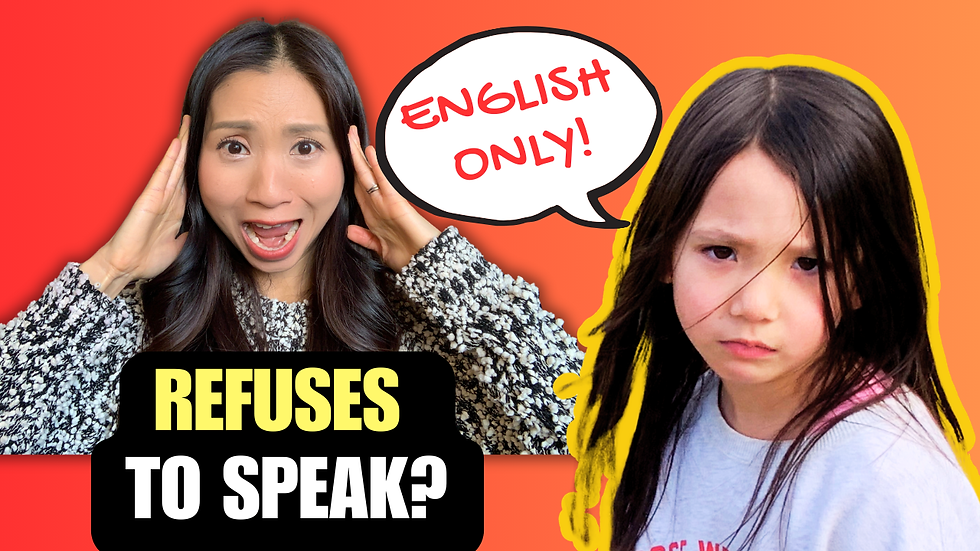Our Chinese New Year! Why Traditional Celebrations Are Crucial for Multilingual Families
- Ka Yee Meck
- Feb 13, 2024
- 3 min read
Table of Contents
As some of you might know, people of Chinese heritage and many other cultures in around Asia have been celebrating the start of the Year of the Dragon last weekend – I’d like to wish you all a happy new year! Xinnian kuaile, gong hei fat choi! 新年快乐,恭喜发财!
As I discussed in my first video of 2024 – one of my goals this year is to really incorporate more cultural activities into our family life in 2024.
So, this year, we really went all out with our Chinese New Year celebrations – yay!
In this video, I mostly want to share with you some photos and video footage of our family reunion dinner which took place New Year’s Eve, but before we dive in, I also want to talk about the importance of celebrating traditions, especially in the context of raising bilingual, trilingual and multilingual children.
Language and Culture, Identity and Heritage
We all know that language is a means of communication.
However, language is also deeply intertwined with culture, identity, and heritage.
For bilingual families, maintaining fluency in their heritage language is often a priority to ensure that children remain connected to their roots.

Take our family, for example – my children are only half Chinese and have never actually set foot in China, but for us, it’s so important that they can feel a connection to their mother’s side of the family, which constitutes half of their cultural and actual biological DNA!
Fostering pride and connection to their cultural roots
Celebrating traditional holidays allows children to develop a deep sense of belonging and identity within their cultural community.
By actively participating in these celebrations, children not only learn the language but also gain insights into the values, customs, and beliefs of their heritage.
These experiences foster a sense of pride and connection to their cultural roots, strengthening their linguistic and cultural identity.

In the past, I always volunteered to do a little storytelling session for my children’s classes in school for Chinese New Year, and the children and I would hand out fortune cookies to the class – well, fortune cookies have very little to do with Chinese tradition, but that’s beside the point!
I was going to give it a break this year, but the children begged me to buy fortune cookies so they could hand them out at school!
It’s really lovely to see the children feeling proud of their heritage and culture and wanting to share this with their friends.
Equally, we love it when children from their school who come from different cultures hand out sweets and share stories to celebrate their traditions, like Diwali and Eid. You can really see how the children feel so much pride in their heritage. It’s genuinely wonderful to see!
Strengthening Family Bonds
Most, if not all, traditional holidays across all cultures are about family. Chinese New Year is no exception.
Celebrating traditional holidays cultivates a sense of togetherness and unity within the family.
As relatives gather to commemorate these special occasions, bonds are strengthened through shared experiences, laughter, and joy.
These moments create lasting memories that children carry with them throughout their lives, reinforcing their connection to their language and culture and creating POSITIVE ASSOCIATIONS with the target language and the associated culture.
Chinese New Year this year was extra special for us because my sister, who lives in Japan, joined us for the celebrations – for Chinese people, New Year’s Eve is a time for family reunion, and this year our family reunion dinner genuinely felt complete!
Bringing the Target Language to Life
I’ve always emphasised the importance of creating immersion when raising a child to speak more than one language.
Celebrating traditional holidays is one of the best ways of creating language immersion away from your "home country".
Such celebrations bring the language to life in ways that no textbooks or language classes can!
All the colours, food, and sounds associated with these cultural traditions will make a powerful impression on your child’s senses, bringing the language to life on a whole new level.

For several days before Chinese New Year, the children and I spent quite some time decorating our place with various decorations, many of which feature Chinese writing.
The kids genuinely wanted to know what the writing meant, showing a lot more interest than they usually do!
After this year’s experience, I’m even more determined to incorporate more cultural elements into our family’s language-learning routine, and I sincerely invite you to do the same in 2024 and beyond.
What are your experiences of traditional celebrations?
Do you feel that they help your child feel more connected to your culture? Share in the comments below!
















Comments